- Home
- Amy Harmon
Infinity + One
Infinity + One Read online
* * * *
Infinity + One
Copyright © 2014 by Amy Harmon
Editing by Karey White
Cover design by Rebecca Berto of Berto Designs
Formatting by JT Formatting
All rights reserved.
Without limiting the rights under copyright reserved above, no part of this publication may be reproduced, stored in or introduced into a retrieval system, or transmitted, in any form, or by any means (electronic, mechanical, photocopying, recording, or otherwise) without the prior written permission of both the copyright owner and the above publisher of this book.
This is a work of fiction. Names, characters, places, brands, media, and incidents are either the product of the author's imagination or are used fictitiously. The author acknowledges the trademarked status and trademark owners of various products, bands, and/or restaurants referenced in this work of fiction, which have been used without permission. The publication/use of these trademarks is not authorized, associated with, or sponsored by the trademark owners.
For more titles by Amy Harmon, visit Amazon
Table of Contents
Title Page
Prologue
Chapter One
Chapter Two
Chapter Three
Chapter Four
Chapter Five
Chapter Six
Chapter Seven
Chapter Eight
Chapter Nine
Chapter Ten
Chapter Eleven
Chapter Twelve
Chapter Thirteen
Chapter Fourteen
Chapter Fifteen
Chapter Sixteen
Chapter Seventeen
Chapter Eighteen
Chapter Nineteen
Chapter Twenty
Chapter Twenty-One
Chapter Twenty-Two
Chapter Twenty-Three
Chapter Twenty-Four
Chapter Twenty-Five
Chapter Twenty-Six
Chapter Twenty-Seven
Chapter Twenty-Eight
Epilogue
Author’s Notes and Acknowledgements
About the Author
THE TELEVISION WAS on. Blaring. It was tuned in to some entertainment news channel, and the program’s hostess sat at a desk as if that made her look smarter and made the show more credible. But her spray tan and her false lashes undermined both the desk and her serious expression, and he reached to turn it off. Then he saw his own face flash across the screen, and his hand fell limply to his side. He stared at a shot of himself smiling down into her upturned face. His arm was wrapped around her waist and one of her hands rested on his chest as she smiled back at him. The image then morphed into an old black and white photo, and he watched, helplessly transfixed, as the hostess of the entertainment show began to lay out her case:
Bonnie Parker met Clyde Barrow in Texas in January of 1930. It was the height of the depression, and people were poor, desperate, and hopeless, and Bonnie Parker and Clyde Barrow were no exception. Clyde was twenty years old, Bonnie, nineteen, and though neither had much to offer the other—Bonnie was already married, her husband long gone, Clyde had nothing but a rap sheet and an ability to survive—they became inseparable. Over the next four years, between stints in prison and life on the run, they would blaze a path through the dusty south, robbing banks, convenience stores, and gas stations, killing police officers and a handful of civilians, and never stopping anywhere for long. A roll of film and a collection of poetry written by Bonnie found at a hideout in Joplin, Missouri, brought the story of the young outlaws to life and cemented their place in the landscape of American history and in the imaginations of a world-wide audience. They were young, wild, and in love, with little regard for anything but each other. They ran from the law, knowing their deaths were inevitable, and in May of 1934, they met their fate. Ambushed on a lonely road in Louisiana, one-hundred-thirty rounds shot into their car, they went down together, their bodies riddled with bullets, their young lives and their crime spree brought to a close. Gone, but not forgotten.
So has history repeated itself? Do we have our own, modern-day version of Bonnie and Clyde? Two lovers, on the run, leaving chaos in their wake? Although not identical, the similarities between the two stories are notable. And one has to wonder if fame and fortune at such an early age aren’t partially to blame in this story. Instead of the poverty that was the backdrop for the Bonnie and Clyde of the 1930s, we have the opposite extreme. But in both cases, we have young people who grew up too fast, were exposed to harsh realities at an early age, and ultimately rebelled against the system.
We’ve seen it time and time again—such a promising career, such a stunning talent. And we’re all left asking, what exactly happened to Bonnie Rae Shelby?
Eleven Days Earlier
“I’VE HEARD EVERYONE screams when they fall—even if they jump.”
The voice came out of nowhere, making me jerk, making my stomach shudder and drop as if I’d actually just let go and was free falling through the fog. I couldn’t see anyone. The mist was thick, giving me the perfect opportunity to let myself slip into the velvety white without anyone knowing. The thickness was deceiving, the density lulling me into a false sense of safety, wrapping itself around me as if it would catch me, as if I could just hide in it for a while. It whispered wetly that letting go would be easy, painless, that I would simply be swathed in a cloud, that I wouldn’t fall. But part of me wanted to fall. That’s why I was here. And I couldn’t get that song out of my head.
Oh, my darling Minnie Mae, up in heaven, so they say
And they'll never take you from me, anymore
I'm coming, coming, coming, as the angels clear the way
So farewell to the old Kentucky shore
“Come on down from there.” The voice came again. Disembodied. I couldn’t even tell which direction it was coming from. It was low, gravelly. A man’s voice. If I had to guess from the timbre, it was an older man, maybe my daddy’s age. My daddy would have tried to talk someone down from a bridge. Or maybe sing them down. I smiled a little at that. His voice was central to my earliest memories. Rich and folksy, thick with the twang and yodel that had become my signature sound. In the beginning, I always took the melody, Daddy dropped to the tenor, and Gran would chime in with the high harmony. We would sing for hours. That’s what we did. That’s what we were good at. That’s what we lived for. But I didn’t want to live for it anymore.
“If you aren’t coming down, I’m coming up.” I jerked again. I’d forgotten he was there. That quickly, I’d forgotten he was there. My brain was as foggy as the air around me, like I’d breathed it in. He said “aren’t” without the ‘r’ and the ‘a’ flattened out—like he was saying the word ant. I couldn’t place the accent. My mind flickered in confusion for a minute. Boston. That’s right. I was in Boston. I’d been in New York City last night and Philadelphia two nights before that. Was it Detroit last Monday? I tried to remember all the stops, all the cities, but they blurred together. I rarely saw much of the cities I found myself in. One place just bled into another.
Suddenly, he was beside me, balancing on the railing, his arms braced against the trusses, his posture mimicking mine. He was tall. I took in his size quickly, peering around my own upraised arms clinging to the support beam above my head. My heart dropped and landed with a sickish thud at the bottom of my stomach. It bounced. My stomach was empty. But that was nothing new. I wondered if the man was a rapist or a serial killer. Then I shrugged tiredly. If I was worried about being raped or killed I could just let go. Problem solved.
“Do your parents know where you are?” There it was again. The flattened “are” without the burr of the ‘r’ at the end. Not the same as my daddy’s
voice after all. Daddy was born and raised in the hills of Tennessee. In Tennessee we say our r’s. We let our tongues curl around the ‘r’ like a lemon drop before we let it go.
“Can I call someone for you?” he tried again when I didn’t answer. I shook my head but I still didn’t look at him. I kept my face forward, looking into the fog. I liked the white nothingness. It soothed me. I wanted to get closer to it. That’s why I’d climbed the railing in the first place.
“Look, kid. I can’t just leave you here.” No ‘r’ again. I was fascinated by his accent, but I still wished he would give up and go away.
“I’m not a kid. So you can leave me here.” I spoke for the first time, noticing how my ‘r’ rang out in defiance, just like my words.
I felt his eyes on my face. I turned and looked at him then. Really looked at him. He wore a knit cap pulled low on his forehead and around his ears the way I did. It was cold out. I’d stolen mine from my security detail, along with a huge hooded sweatshirt someone had left in my dressing room. His cap looked natural on him. He hadn’t stolen his, I was sure. Shaggy blond hair peeked out beneath the cap, but his eyebrows were thick and almost as dark as the knit of his hat—black slashes above eyes of an undecipherable color. In the foggy darkness everything was just different shades of grey. His gaze was steady, and his mouth pursed slightly as if I’d surprised him. It seems we’d both been wrong. I wasn’t a kid and he wasn’t an older man. He was maybe a few years older than I was, if that.
“No, I guess you aren’t,” he said, his startled gaze flickering to my chest as if to verify that I was, indeed, female. I raised one eyebrow and lifted my chin, demanding that he lift his gaze in return. He did, almost immediately, and he spoke again, his voice measured, his tone mild.
“The odds are, if you fall, you’ll die. Falling might feel good. But landing won’t. Landing will feel like shit. And if you don’t die, you’ll wish you had, and you’ll wish you’d never let go in the first place. And you’ll cry out for help. But then it will be too late, because I’m not jumping in after you, Texas.”
“I don’t remember asking you to, Boston,” I shot back wearily, not correcting him on my origins. Everybody with a drawl must be from Texas, apparently.
His eyes rested briefly on my boots and then slid up to mine, calculating. “You and I both know you aren’t gonna do it. Cut the drama, climb down, and I’ll take you wherever you wanna go.”
It was the wrong thing to say. I felt the fury fill my empty gut and roar up my throat like flames in an elevator shaft. The tears started streaming down my cheeks, my body’s natural, protective, response to the inferno raging in my chest. I was exhausted. Completely spent. Emotionally and physically done. I was tired of being told what to do, when to do it, how to do it, and who to do it with. I was tired of never making any decisions for myself. So then and there, I made a big one. His words cemented my resolve. And I saw the moment when he knew it. His mouth moved around a silent curse and his eyes widened.
I leaned into the fog and let go.
WHEN MY TWIN sister died, death became very real. It was something I thought about almost constantly. And because she was there, wherever dead people are, and because I loved her more than I loved anyone on Earth, part of me wanted to be there too. And so I started to consider my own death, to contemplate it, to wonder. I didn’t just suddenly want to die. It’s not something that happens suddenly. It starts as a thought that flickers in the darkest recesses of your brain for a second, like a birthday candle just before it’s extinguished. But death is a trick candle. The kind that you rub out only to have it flame up again. And again. And each time it flickers back to life, it lingers a little longer and glows a little brighter. The light seems almost warm. Friendly. It doesn’t feel like it’s something that will burn you.
Eventually, the flickering thought becomes an option, and the option becomes detailed and precise, with a plan A and a plan B. And sometimes a C and D. And before you know it, you start to say goodbye in little ways. “Maybe this should be my last cup of coffee. The last time I tie these shoes, the last time I pet my cat. The last time I sing this song.” And there is relief with each “last”—like checking chores off a long, burdensome list. Then the little candles in your head become burning bridges. People who want to die burn bridges right and left. They burn bridges, and then they jump off of them.
That night, I had kicked everyone out of my designated dressing room. I made them all leave. I smiled and spoke softly. I didn’t scream or cry or have a diva moment. I never did. That was Gran’s job. I just asked for a few moments by myself. It was the last night of the tour and everyone would want to celebrate. I’d sung at Madison Square Garden the night before and Gran was in heaven. Tonight we were at another “garden” arena—TD Gardens, they called it. I knew I should be thrilled. But I wasn’t. I felt hollowed out like a big, empty watermelon. Daddy used to cut off the top and eat watermelon like ice cream, spoonful by spoonful, until it was just an empty gourd. Then he’d put the top back on so it looked brand new. More than once Mama had taken his name in vain when she discovered that the insides had been scraped clean.
They had all cleared out—my stylist, Jerry, my makeup artist, Shantel, and a few others, wives and girlfriends of the road crew who wanted to be there for the last night of the tour. The show was over, after all. Well, almost. I’d left the stage before the final song and my opening acts and the band were bringing it home in the medley we always performed together to close the show.
I’d said I was sick. But before leaving the stage, I’d performed just like I’d been trained to do. I’d sung the songs from my latest album, as well as favorites from the previous three. With four albums under my belt, not counting the rushed release of all the songs I’d sung on Nashville Forever a month after my big win, I was established in the business, a headliner, a Grammy winner, and my latest album, Come Undone, had gone platinum.
I had fulfilled my obligations. And no one could say I hadn’t delivered. I had sung my heart out, belted out each note while prancing around on stage in the carefully chosen costume—artfully torn, skin-tight, blue jeans and a black silk shirt with high-heeled, red cowgirl boots—straddling the line between pop princess and country crooner to maximize my marketability.
The lights had been hot on stage, but my makeup was still in place, fake lashes and expertly applied shadows and liners made my dark brown eyes look deep and soulful, big puppy dog eyes framed by loose golden curls. Those long, blonde, Bonnie Rae Shelby curls that had become the style little girls everywhere tried to copy. I could have told them it was easy. Mine were store-bought. All the little girls could buy them too. Sure, now they were expensive, but they didn’t start out that way.
When Minnie’s hair had started falling out because of the chemo, we decided to shave our heads together, light brown hair falling to the floor in fluffy piles. We were twins. Identical twins. Mirror image twins. If Minnie was going to be bald, I had to be bald too. But Gran said I couldn’t be bald on stage, so the day I auditioned for Nashville Forever, Gran took our bus money (and our food money) and bought me a wig with long, ash-blonde curls.
“Dolly Parton always wears wigs, Bonnie,” Gran had said brightly, pulling the wig over my smooth head. “Look at you! Blonde hair suits you, Bonnie Rae. It makes you look like a little angel. That’s good. That’s what we want. Angel hair to go with your angel voice.”
I’d had angel hair ever since. Except now I didn’t wear a Dolly wig. I had extensions and professional dye jobs and a hairdresser that traveled with me everywhere I went. A hairdresser, a makeup artist, a stylist, and a team of bodyguards. I also had a publicist, an agent, and a lawyer on speed dial. And Gran. Gran was a little bit of everything. But mostly, she was my manager.
Gran hadn’t wanted me to go up to my dressing room without her. Gran was smart. And tough. And sometimes a little mean and scary. And she smelled something off. She smelled the burning bridge. She just couldn’t see the smoke.
/>
“Give me a second, Gran. I’m twenty-one years old. I can be alone for thirty minutes without the world falling apart.” My voice was placid, but inside I was flinching. I was such a liar. Her world was going to fall apart tonight. Such irony. She nodded once, and then turned away to attend to business.
Now, I was alone.
I looked at myself in the big mirror in front of me. There were mirrors everywhere. I ran my hand over my curls and blinked my eyes a few times. And then I pulled out the scissors I’d taken from Jerry’s little bag of tricks. And I started to snip. Snip, snip, snip. And the angel hair started falling around my feet, just like it had six years before. A few strands landed on my shoulders and in my lap. A clump fell down the front of my shirt and I started to laugh, the hair peeking out of my cleavage like I was a man with boobs. I laughed harder as I cut. And then there was only a little hair left. It stood up in short tufts on my head and around my ears, jagged and uneven. It was even shorter than Damon’s. Damon was the drummer for the Bonnie Rae Shelby Come Undone Tour. I thought he was cute but Gran kept him away because she heard he had Herpes. I was pretty sure it was because he had a penis. Gran did her best to keep all the guys away.
The laughter hiccupped into something closer to tears as I looked at what was left of my hair, knowing there was no turning back now, knowing Minnie wasn’t here to go hairless with me. I squashed the regret and pulled off my fake eyelashes, wincing as the spidery legs resisted being plucked free. I scrubbed my makeup off with a handful of wet wipes and pulled a stocking cap down low over what remained of my angel curls. The knit cap smelled like Bear—it was his hat—and I felt pain again, pain that was harder to squash than the regret. I would miss Bear. He would miss me.
The red boots and jeans would have to stay. I didn’t have anything else to wear or time to change. The oversized tour sweatshirt went on next, all of our 2013-2014 tour dates printed on the back in long rows. It made me tired just looking at them. I pulled the hood up over my stocking cap, shading my face like a gangster wannabe. I needed to hurry. I didn’t clean up the hair. I left it strewn in a sloppy mess across the vanity and on the floor. I don’t really know why I wanted Gran to see it. But I did.

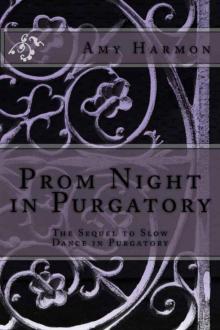 Prom Night in Purgatory
Prom Night in Purgatory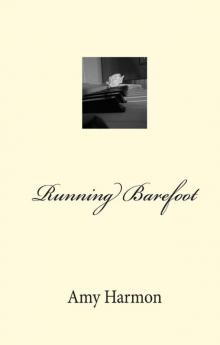 Running Barefoot
Running Barefoot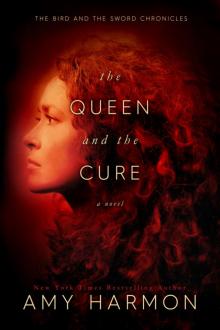 The Queen and the Cure
The Queen and the Cure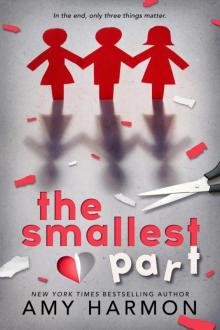 The Smallest Part
The Smallest Part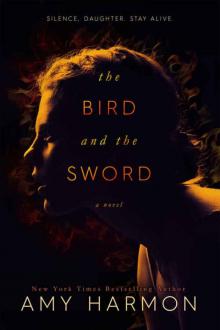 The Bird and the Sword
The Bird and the Sword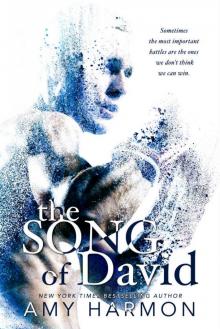 The Song of David
The Song of David Infinity + One
Infinity + One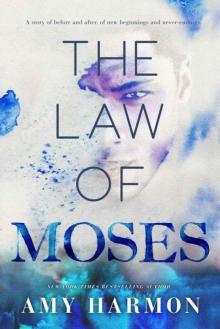 The Law of Moses
The Law of Moses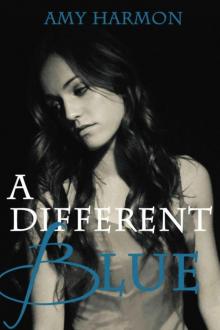 A Different Blue
A Different Blue From Sand and Ash
From Sand and Ash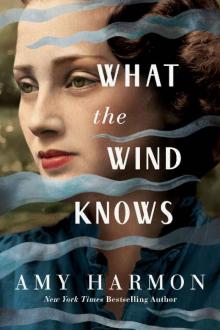 What the Wind Knows
What the Wind Knows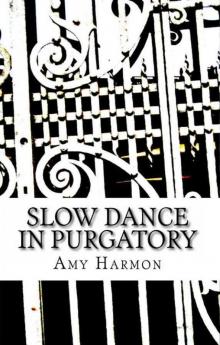 Slow Dance in Purgatory
Slow Dance in Purgatory Romance Through the Ages
Romance Through the Ages